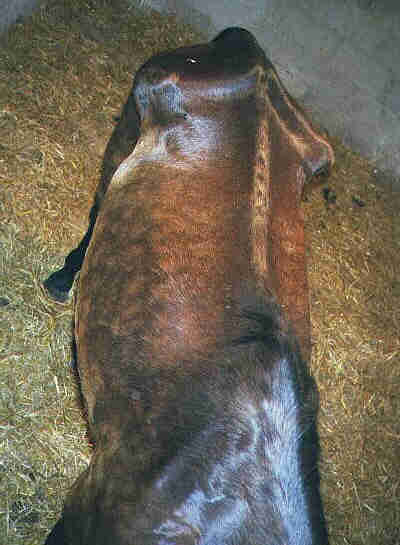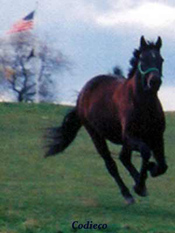General
Press
Horse Slaughter
Horse Transport
Horse Cruelty
Legislation
Stolen Horses
SiteMap
Horse Rescue
Rescue Stories
Turning Copper Into Gold
July 1996
Mare is Saved From Auction-Scored a Minus 1 On the Henneke Chart!

The Miracle Mile
July 1990
Pregnant Mare Foals Hours After Rescue From Slaughterhouse-
Foal is a Stakes Winner!

The Horse That The Killers Refused to Bid $5.00 On
July 1999
Emaciated and Sick Gelding Is Saved From Auction!
No charges ever filed...

Links
California Voters "Just Say Neigh" to Horse Slaughter!
HoofPAC
The EPN gets $5 extra the first time you shop!
PayPal accepts credit cards! Please send your tax deductible donation to the:Equine Protection Network, Inc.,
P. O. Box 232, Friedensburg, PA, 17933.
HoofPAC is the political action committee that has been formed to end the slaughter of America's horses. Cathleen Doyle, founder of HoofPAC, led the successful Save The Horses campaign in 1998 that made the slaughter of California's horses a felony.

Adopting A Horse
The EPN does not specialize in adopting horses. The following information is provided as a courtesy. Information presented here as been gleaned from working in conjunction with horse rescue organizations.
When contacting horse rescue organizations by E-Mail, fax or phone it is imperative that you indicate what state you are located in. Many horse rescue organizations have geographical restrictions for horse adoptions. For example, many organizations will only adopt horses within a three (3) hour radius, or only within the state(s) that the rescue resides in or has satellites. Please respect these organizations policies.
If you are not located within the organization's adoption area, often the organization is able to refer you to a horse welfare organization in your area. Please save the horse welfare volunteers extra work by remembering to include your state!
Adoption Procedures
The vast majority of horse welfare organizations require that the prospective adopter fill out an application. The questions asked vary from organization to organization. Expect to answer questions regarding, but not limited to:
- Name
- Address
- Current Employment & Employment History
- Social Security Number
- Driver's License
- References, including veterinarian
- Horse Experience
- Description of facility where horse to be housed
Please understand that the organization is asking these questions to protect the welfare of the horse. Owners who donated their horses to the organization have entrusted their horses' welfare and care to the organization. The organization is duty bound to due a thorough background check on prospective adopters.
Expect to sign an adoption contract. These contracts will vary from organization to organization. You should feel free to have your attorney review the contract before you sign it. Some common provisions in the contracts are:
- Organization's right to inspect the horse and the facility on a regular basis
- Organization's right to remove the horse if the requirements of the contract are violated.
- Facility where horse is housed must meet certain requirements
- Restriction on use of the horse(s)
- Prohibition of breeding
- Organization retains ownership
- Liability for damages caused by the horse are the responsibility of
the adopter, not the organization
Adoption Fees
Each organization sets their adoption fees. There is a wide variation on fees. Some organizations choose the flat fee method. The other method is the floating fee method.
The flat fee method is when every horse, no matter the age, level of training, or soundness has the same adoption fee.
The floating fee method uses a criteria set by the horse rescue organization to determine the adoption fee for each individual horse.
Questions about refunding the adoption fee if the horse does not work out or if the adopter decides to return the horse for another horse need to be answered by individual organizations. It is recommended that as the adopter you are aware of and understand this policy. To avoid misunderstandings on both sides it is preferable to have the policy in writing.
Ownership
Each horse welfare organization has different policies on this issue. Some organizations never relinquish title to the horse, and will always remain the owner of the horse. Other organizations relinquish title after so many months or years of "adoption". Some organizations have changed their policies in the course of their existence.
Horses
The horses available for adoption from horse welfare organizations run the gamut from ex racehorses to retired broodmares to pasture companions.
Organizations often specialize in certain areas of horse rescue.
Those that specialize in racehorses may have horses that were donated due to the fact that they were too slow on the racetrack. The horse is sound but in need of retraining. Others have an injury that needs time off and/or rehabilitative care. Others are nothing more than companion horses that can never be ridden.
Other organizations may receive horses in animal cruelty cases. The horses in these situations can be any type of horse.
Many horse welfare organizations purchase horses at auctions and then rehabilitate the horse before offering the horse for adoption. Any horse, with or without problems can end up at a horse auction in poor condition through no fault of their own.
It is important to realize that many horses offered for adoption through horse welfare organizations are usable horses. To make the statement that every horse has a problem is a mistake. Walk through any boarding, training, show or race barn and locate the horse with no problems. No horse is perfect.
Many owners are choosing to donate their horses to horse welfare organizations rather than sell the horse due to the simple fact that the owner wants the horse to be protected for the remainder of its life.
It is important when adopting a horse from any horse welfare organization that a few important criteria are adhered to for purchasing a horse be followed:
- Negative Coggins Test
- Vaccinations are current
- Deworming is current
- Teeth floated
- Hooves trimmed
- Medical conditions are disclosed
- Horse is free from disease
- Health record disclosed and accompanies horse
Remember that the goal of these organizations is to provide good homes for horses and to protect them from further abuse, neglect and/or slaughter.
Also important is the fact that just because an organization is a non-profit horse rescue is no excuse for sub standard horse facilities or management practices. A facility may not be fancy, but as an old time Irish horseman stated, " A rake and a broom don't cost much."
Commitment - Do You Know Where Your First Horse Is?Make the Commitment to Your Horse andSave America's Horses!
|
|||||||


